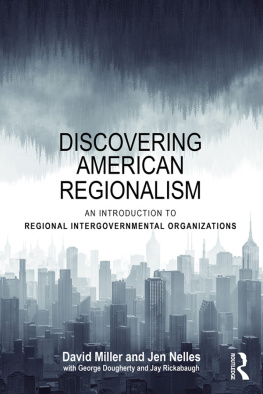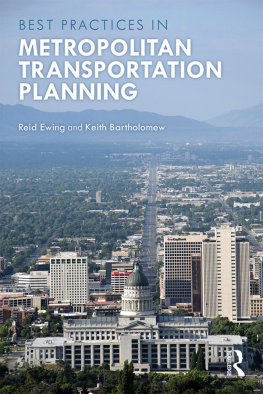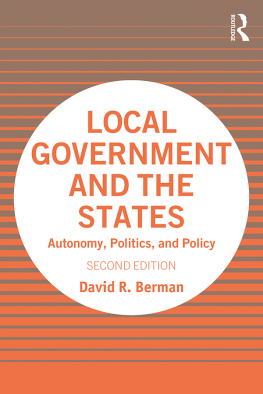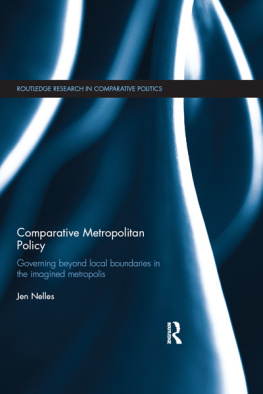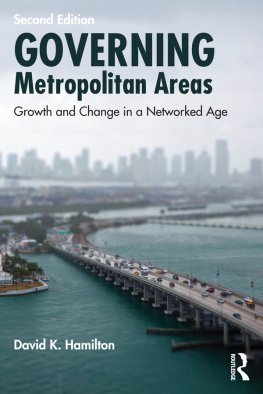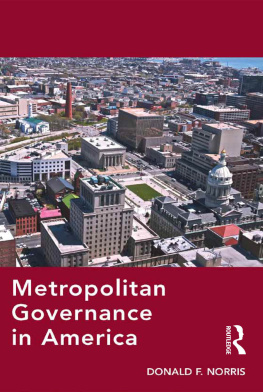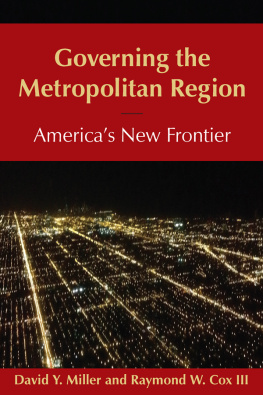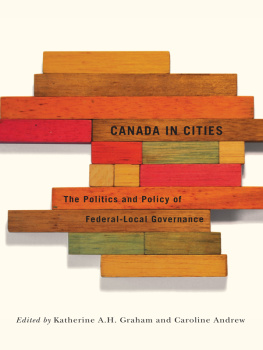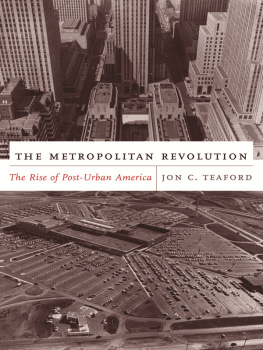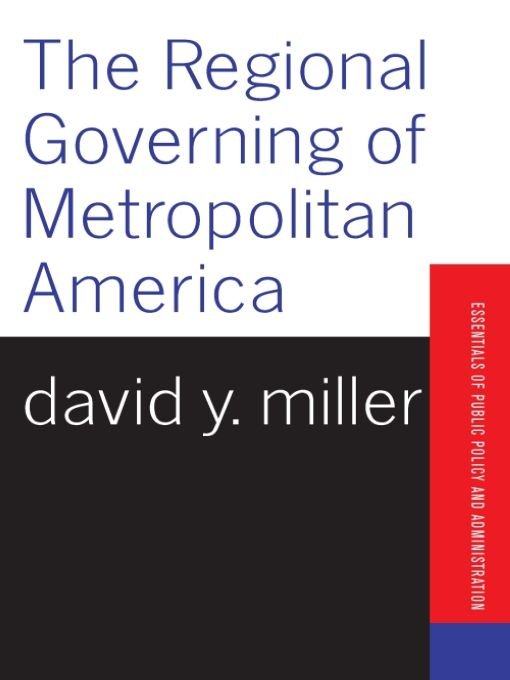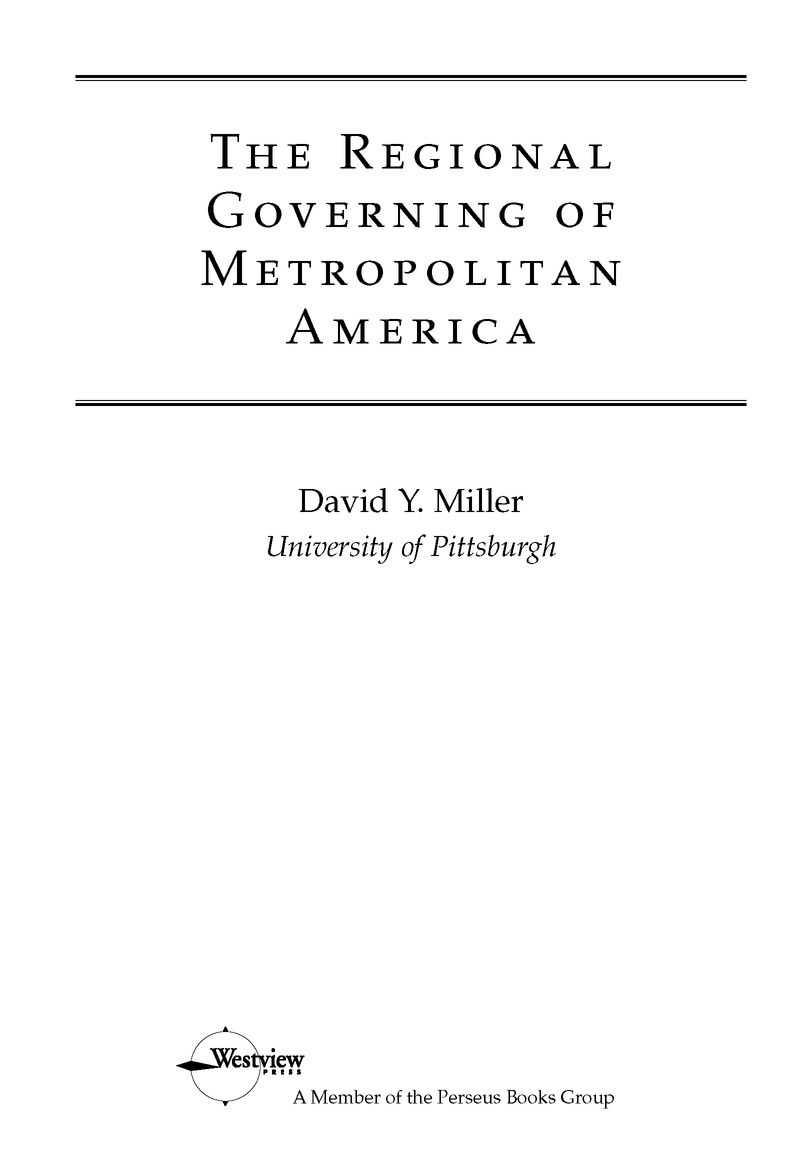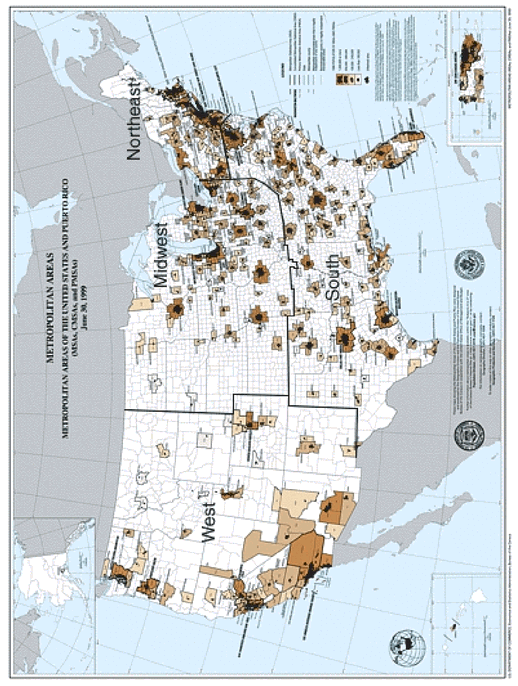Table of Contents
List of Tables
ESSENTIALS OF PUBLIC POLICY AND ADMINISTRATION SERIES
SERIES EDITOR: Jay Shafritz
University of Pittsburgh
Westview Press proudly announces a new series of textbooks for public policy and administration courses. Written for students at both the advanced undergraduate level and graduate level, these texts follow a standard design and format which allows them to be incorporated easily into multiple courses. Each text covers a core aspect of public policy and administration that is commonly discussed in the classroom. They are written by authorities in their fields, and will serve as both core and supplemental texts.
New titles in the series include:
Managing Diversity in Public Sector Workforces, Norma M. Riccucci
Comparative Public Administration and Policy, Jamil E. Jreisat
The Regional Governing of Metropolitan America, David Y. Miller
ACKNOWLEDGMENTS
Writing the beginning of a book at the end of the process has proved to be a relatively easy task. I say that as I fly over the Atlantic Ocean, returning from a vacation in several European metropolitan regions. The experience has left me with an ever greater sense of the current and emerging importance of metropolitan regions in the United States. It has also left me with a sense of how fundamentally different they are than their European counterparts.
I am indebted to a number of individuals. This book is heavily influenced by systems theorythe notion that processes and components are linked in ways in which the sum of the parts is greater than the whole. A metropolitan region is, indeed, a system that can be conceptualized, studied, and treated as a whole, even though it lacks the political and institutional structure of formal political jurisdictions like nations, states, and cities. For this insight, I am grateful to Alex Weilenmann. I am also even more grateful for his patience in letting me conceptualize systems theory at my own pace, although I now recognize how painfully slow that must have appeared to Alex.
Although I consider myself a social scientist, mathematics has never been one of my stronger subjects. However, in the emerging discipline of the study of metropolitan regions in the United States, I believed we needed a simple and easily understandable way to measure those regions against each other to capture their political structure. It was Bill Matlack who, over coffee, laid out the mathematics of my political theorizing about what I have called the Metropolitan Power Diffusion Index (MPDI).
Breathing life into the MPDI also required someone with the conceptual and technical skills to translate an idea into action. For this role, Chris Briem at the University Center for Social and Urban Research proved invaluable.
Under the adage of failure to see the forest for the trees, I am indebted to Jane Lohman. Her reading of the text and subsequently eliminating many of the idiosyncratic foibles of my writing style has greatly improved the prose. In similar fashion, early versions of the text were helped by my graduate assistant, Amy Camp, and my summer 2001 class on Comparative Regional Governance at the University of Pittsburgh.
Although they all contributed to the final version, the ultimate responsibility for any errors or omissions, factual or conceptual, rests with me.
No work of this magnitude can be accomplished without patience. Lacking that virtue myself, it is to my wife that this responsibility fell. She assumed that role without hesitation as she always has. It is to her that this book is dedicated.
D. Y. M.
Introduction
This book is about the governing of metropolitan regions in the United States. The concept of a metropolitan region is relatively new. Faced with the rapid growth of suburbs, the creation of satellite cities, new modes of transportation, increased mobility of citizens, and easier forms of communication, an academic roundtable on regional planning proposed that a new political or administrative entity at the metropolitan level needed to be created that was different from the precinct, ward, municipality, county, or state. The year was 1926. Seventy-one years later, Anthony Downs lamented, As Congress shifts many federal powers to lower levels of government, it is missing a unique opportunity to resolve a fundamental flaw in Americas government structure: the absence of any authority at the metropolitan regional level. Metropolitan regions have become the most important functional units of economic and social life in almost all modern societies (Downs, 1997).
The road to the metropolitan region takes us through the land of local government. Local governments are the building blocks of the metropolitan regions. The American system of governing and government is best understood as a territorial based distribution of power and responsibility. It is steeped in both law and popular culture. Over 40 years ago, Arthur Maas (1959) defined the structure of local government in the United States as an areal division of power wherein the territorial bounded local governments were, by culture and practice, an integral part of a system of organizing that divided power between the federal, state, and local governments. In 1868, Justice Dillon (City of Clinton v. The Cedar Rapids and Missouri Railroad) articulated Americas legal doctrine on local governments, calling them mere tenants at will of their respective state legislatures which could be eliminated by the legislature with a stroke of the pen. Dillon also articulated Americas popular doctrine on local governments by calling such an act (the elimination of a local government) so great a folly, and so great a wrong. Such is the paradox of local government in United Statesso weak, yet so strong.
Thomas Jefferson (quoted in Syed, 1965: 40) called townships the wisest invention ever devised by the wit of man. Alexis de Tocqueville (1805-1859), a French sociologist reporting back to Europe in 1840 on the new experiment in democracy in America, called the New England towns the real innovation in human organization. He pointed out that the townships have not been invested with privileges, but they have, on the contrary, forfeited a portion of their independence to the state (de Tocqueville, 1946: 57). Zuckerman (1970: 46-47) maintains that colonial America used the terms the people and individualism to mean the people or individuals aggregated on different principles than those of the centralized statesovereignty in severalty, the sovereignty of local groups and localities. Wendell Phillips (cited in Hofstadter, 1948: 162), a 19th century American abolitionist and socialist, captured this American vision when he said, My ideal of a civilization is a very high one; but the approach to it is a New England town of some 2000 inhabitants, with no rich man and no poor man in it, all mingling in the same society, nobody too proud to stand aloof, nobody too humble to be shut out.
This tradition of strong local government is so embedded within the context of the American system that Thomas Reed (1925: 417), when proposing the creation of a new governmental unit he called a metropolitan region, was quick to point out, Metropolitan organization... must not fly in the face of the traditions and habits of the people, but must leave in existence, to the greatest extent possible, the customary units of local government.


